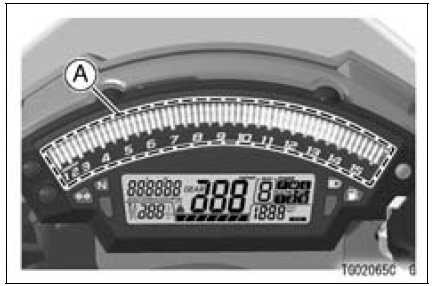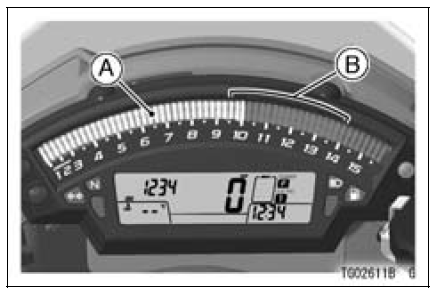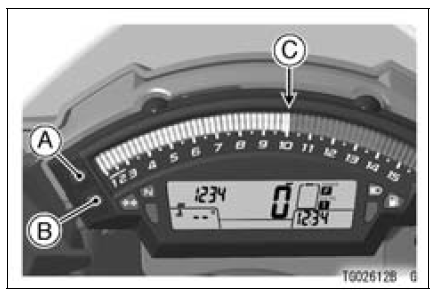

The tachometer shows the engine speed in revolutions per minute (r/min, rpm).
On the right side of the tachometer face is a portion called the “red zone”.
Engine r/min (rpm) in the red zone is above maximum recommended engine speed and is also above the range for good performance.

A. Tachometer
When the ignition switch is turned to “ON”, the tachometer LED segments are blinks for a few seconds then goes off. If the tachometer does not operate correctly, have it checked by an authorized Kawasaki dealer.
NOTICE
Engine r/min (rpm) should not be allowed to enter the red zone; operation in the red zone will overstress the engine and may cause serious engine damage.
Shift-up Indicator
The shift-up indicator can be set to tachometer LED segments blinks at the desired engine speeds. This indicator is used to inform the rider when it is time to shift to the next higher gear.
This shift-up indicator is used to inform to the rider when it is time to shift to the next higher gear with blinking the tachometer LED segments.
The shift-up indicator can be used in closed course competition. Do not use the shift-up indicator during everyday riding.
Shift-up Indicator Setting
The shift-up indicator has three modes, light off, fast blinking or slow blinking. The shift-up indicator timing can be adjusted between 9 500 r/min (rpm) and 14 000 r/ min (rpm).

A. Tachometer
B. Adjustable Range
To select a shift-up indicator mode or adjust the shift-up engine speed setting in the tachometer, do the followings while the engine is at a stop.
The previous shift-up engine speed setting will be displayed in the tachometer.

A. Upper Button
B. Lower Button
C. Shift-up Engine Speed
The tachometer now operates normally.
| WARNING Failing to properly observe the road ahead increases the chance of an accident. Do not concentrate on the shift-up indicator by taking your eyes off the road, observe using peripheral vision. When shifting down to a lower gear, do not shift at such a high speed that the engine r/min (rpm) jumps excessively. Not only can this cause engine damage, but the rear wheel may skid and cause an accident. Downshifting should be done below 5 000 r/min (rpm) for each gear. |
NOTE
NOTICE
Engine r/min (rpm) should not be allowed to enter the red zone; operation in the red zone will overstress the engine and may cause serious engine damage.
 Meter instruments
Meter instruments Instrument display brightness control
Instrument display brightness controlSwingarm Installation
Visually inspect the chain guide [A].
Replace the chain guide if it shows any signs of abnormal
wear or damage.
Apply a non-permanent locking agent to the threads of
the chain guide bolt [B].
Apply plenty of grease to the lip of the oil seals [A].
Be sure to install the oil seals ...
Clutch
Clutch Operation Inspection
Pull the clutch lever just enough to take up the free play
[A].
Measure the gap between the lever and the lever holder.
If the gap is too wide, the clutch may not release fully. If
the gap is too narrow, the clutch may not engage fully. In
either case, adjust ...
Special Tools and Sealant
Oil Pressure Gauge, 10 kgf/cm²:
57001-164
Oil Pressure Gauge Adapter, PT3/8:
57001-1233
Outside Circlip Pliers:
57001-144
Liquid Gasket, TB1211:
56019-120
...